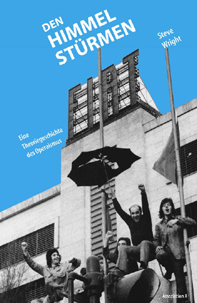

Steve Wright: »Den Himmel stürmen«
Besprechung
Social Movement Studies, Vol. 3, No. 1, April 2004
Author: Steve Wright
Title: Storming Heaven. Class composition and struggle in Italian Autonomist Marxism
Place & Date of publication: London, 2002
Name of publisher: Pluto Press
Italian workerism (operaismo) and, arguably its core theory on 'class composition', lie at the root of 'autonomist Marxism', a significant current within the 'new global' movements, particularly since the historic events in Genoa in July 2001, when the 'Disobedient' and others in the squatted social centre/free radio networks with roots in the experience of the Autonomia social movement of the 1970s played a pivotal role in successfully mobilising hundreds of thousands of protestors in the teeth of some extremely brutal repression. The recent publishing success of 'Empire', Negri and Hardt's controversial analysis of global governance and its multitudinous opposition, has also served to focus long overdue international attention on this 'heretical' tradition within Italian Marxism.
Steve Wright's cogent and richly referenced study, putting a wealth of Italian sources into the English domain for the first time, will meet the needs of those activists and Italianists hungry to know why Italian autonomists are still among Europe's most innovative anti-capitalists, twenty years after suffering virtual annihilation at the hands of the Italian state. 'Storming Heaven' also balances the somewhat sectarian analyses of Italian autonomist Marxism by those close to 'Globalise Resistance' who seem keen to dismiss rival analyses and organisational forms as irrational utopias in their own rush towards the dystopia of 'hegemony within the movement'; ironically, the very error made by Organised Workers Autonomy, operaismo's final mass political emanation, with regard to the extraordinarily creative but rapidly doomed '1977 Movement', as Wright relates in chapter 7.
He highlights the importance of the insights on the 'social factory' and the 'mass worker' (but not Negri's 'socialised worker' which is lambasted) provided by a unique generation of dissident Marxist workers, academics and activists, who from the 1950s onwards in a series of journals and, later, political organisations, attempted to resolve the post-war crisis of the Italian Left by studying the behaviours and attitudes of the 'new working class' via a rereading of Marx and an adapted version of his 'workers' enquiry'.
Nevertheless, Wright's conclusions on Italian workerism and its distinctive emphasis on the relation between the technical and political composition of the working class as the basis of its self-valorisation and autonomy are mainly pessimistic. He chides operaismo for 'political impatience', a 'penchant for all-embracing categories that, in seeking to explain everything, too often would clarify very little' and a 'too narrow focus upon what Marx termed the immediate process of production as the essential source of working-class experience and struggle' (p. 225). Or as Mario Tronti, a leading light of workerism in the 1960s who later returned to the PCI, stated at the end of its parabola in the late 1970s: 'many flowers, little fruit'.
Wright has written a tremendously important book for the historiography of Italian radical social movements. He goes a long way in plugging the gaps left by previous English language analyses of Italy in the 1960s and 1970s which have failed to recognise the importance of the operaista experiment for the social movements of the Italian Left.
Patrick Cuninghame